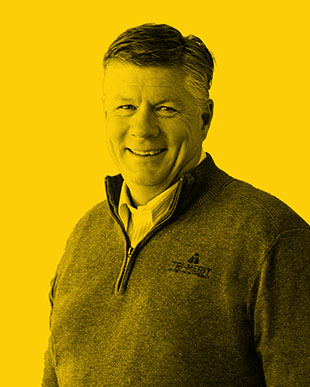IN PLAY: Randy Crabtree, CPA
With a storied career built on the success of chasing his passions, this specialty tax expert and podcast host advocates for finding another way forward for the profession.
By Amy Sanchez | Spring 2025

“I have a hard time not acting on ideas that I get excited about,” admits Randy Crabtree, CPA, co-founder of Tri-Merit Specialty Tax Professionals and host of “The Unique CPA” podcast.
Fortunately for the accounting profession, Crabtree would get one of those ideas while driving down North Ave. in Melrose Park, Ill. one day: “I had this brainchild, light-bulb moment where I suddenly thought, ‘I need to be a certified public accountant (CPA).’ I pulled over to a phone booth, called my wife, and said excitedly, ‘I’m going to quit my job, go back to school full-time, and become a CPA.’”
Pursuing accounting was never part of Crabtree’s original plan. In college, he graduated with a degree in computer science, worked as a programmer for about a year, and then pivoted into sales: “I got a job with a food brokerage selling food—and while I like food, I’m not passionate about talking about it or selling it.”
However, that day on North Ave., Crabtree remembered an accounting class he took as an undergraduate: “It was a dead-end class for me, but I remember enjoying it lot.” Also on that drive, Crabtree recalled the time he did his taxes for the first time on his own after he and his wife got married. “It was the first time I had done a tax return because my dad always did it for me—and I realized I really enjoyed working on taxes. It was fun!”
Just like he said he would, Crabtree earned his CPA and would later start his own firm. While working for the firm, he also pursued another passion project, a real-estate opportunity with one of his clients. However, Crabtree soon learned his limitations.
“I got to the point where I couldn’t do both,” Crabtree explains. “I think it’s partly because I created a firm that was built for burnout—I built it really tax heavy.”
That’s when Crabtree decided to sell the firm and concentrate on real estate exclusively—though it wouldn’t last, and in May 2006, Crabtree’s partner bought him out. That August, Crabtree found a new passion through the research and development tax credit: “When I realized I could create a firm that just focused on this tax credit and concentrate my time on this one area that I’m passionate about, that was exciting.”
Not soon after, Crabtree started Tri-Merit Specialty Tax Professionals, with the goal of learning from his previous mistakes: “I never set boundaries with clients. I was reactive to what they wanted rather than being proactive to what they needed. And now, I see so many people doing it so much better—that’s why I’m so passionate about helping the profession move forward in a different way.”
Another big part of Crabtree’s passion for changing the profession’s traditional approach to work stems from being both a stroke and mental illness survivor.
“Physically, I recovered very fast from my stroke. Mentally, I struggled for about four-and-a-half years,” Crabtree says. “Four days after the initial stroke, I ended up back in the hospital with another stroke—very minor but another. So, every single time something started happening, my head would think I’m having another stroke. It was causing post-traumatic stress disorder and panic attacks, which ultimately turned into depression.”
With help, Crabtree was able to learn that a lot of what he was experiencing was just his mind playing tricks on him: “I realized it was just me—it was internal. I realized we do this as a profession too. We put all this undue stress and pressure on ourselves, and we get into this chronic stress area, especially during tax season, where we really feel like we have no control—but we do.”
For Crabtree, talking about his experience with depression has been an important part of his recovery. In fact, he continues to talk about it at accounting conferences and meetings: “After every presentation I give, multiple people come up to me and say, ‘I just assumed this is how it had to be. After listening to you, I feel like there’s hope—there’s something I can do about it.’”
Today, Crabtree continues to advocate for finding a better way forward for the profession through talking with other professionals on his podcast and bringing small and large firms together for the Bridging the Gap conference, which he describes as a “wellness retreat combined with an accounting conference.” He believes helping others see how integrating someone’s passions into their work—just like he’s been able to do throughout his career—is the key to changing the profession: “I live at the intersection of my passions and my skills, and it’s an unbelievable place to be. I want everyone to get to that intersection.”
Related Content: